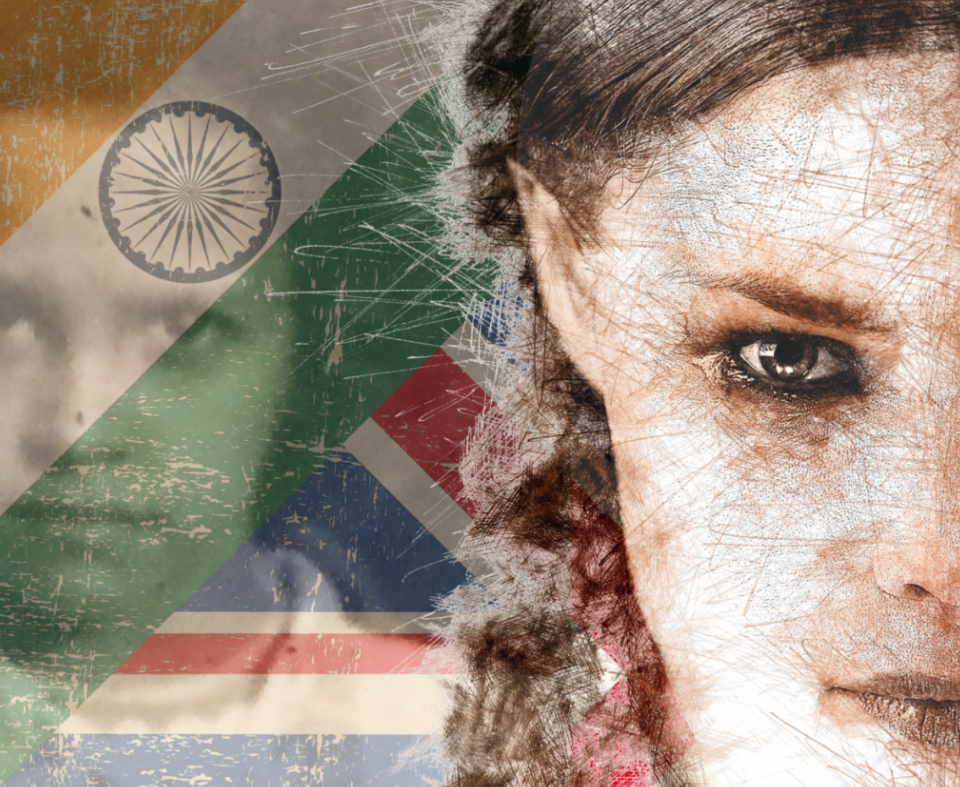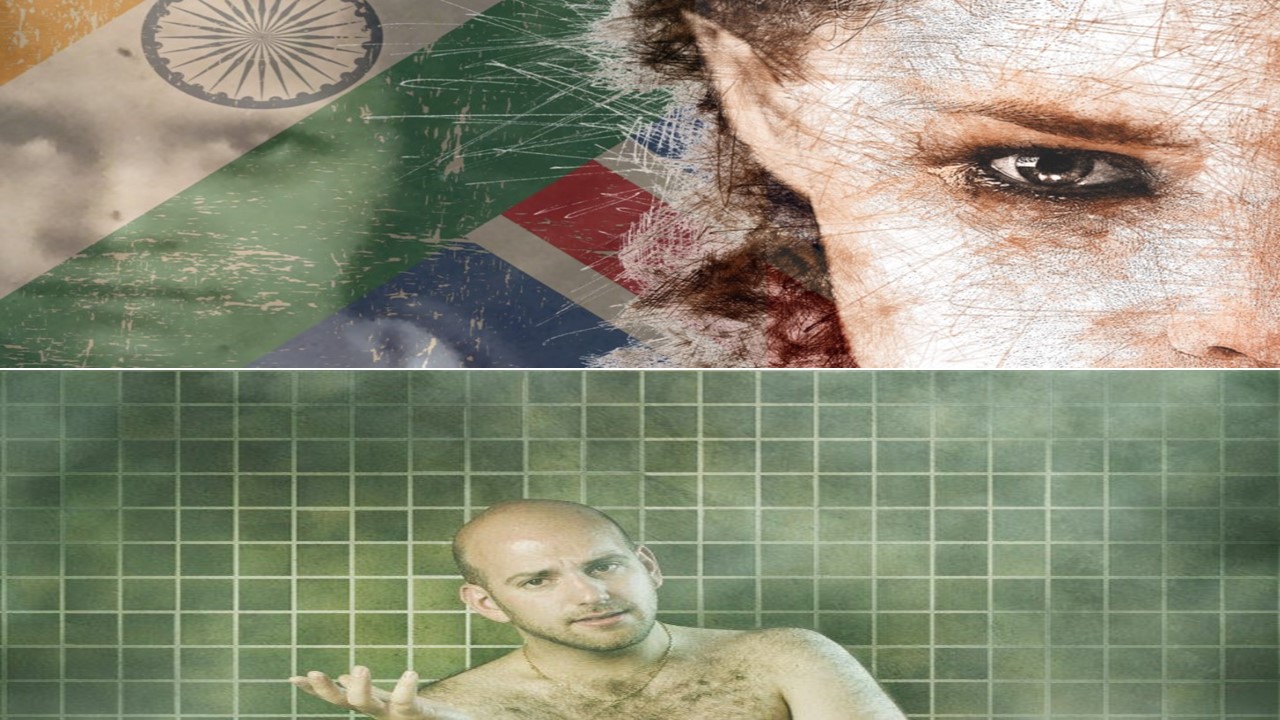
Slung Low the ‘pay what’s right for you’ theatre in Holbeck Leeds presented a double bill of performances without any obvious connection. They were not part of a festival, by the same writer, or featuring the same actors. They are not even the same style of performance. What they are, without shouting about it, are highly personal accounts of people who undertake journeys into their family history, and their own identity.
The first performance, Between the Two, is about what happened to one of Indian’s many minority groups at the end of the British Raj and the separation of Pakistan from the rest of British India.
Over more than 200 years of British rule many British people had formed relationships with Indian people. The children of these marriages created a new social group in the caste dominated Indian culture; Anglo-Indians.
At the time of independence this group found themselves caught Between the Two. Not white enough to be British and for many Indians an unfortunate reminder of a hated colonial past.
Between the Two follows the director’s own Anglo-Indian family as they travel from India to the UK in the hope of a new life in the country they have been brought up to view as the mother country. The drama starts with the family embarking in Bombay and ends with a much-changed family disembarking in the UK. On the way, we learn about how life in Indian changed, their hopes and fears for the future and the tensions this all creates within the family.
Through the comments of the ship’s crew I realise that the UK might not be equipped to fulfil the expectations of this prodigal family. It brings to mind the news reports of interviews with asylum seekers talking about why they are striving to reach the UK and other European countries, when I know that they will not find streets that are paved with the gold in the way that they have been led to believe.
Some scenes in Between the Two are set on the ship, some as glimpses of what they expect life will be like in the UK and others as flashbacks to what life was like in India. It is a format that I am used to seeing on the big and small screen, where the opportunity to completely change costumes, scenery, and background sound makes it easy for my brain to adapt. On stage, with a small cast it is not as straight-forward. The story is compelling. It could easily make one of those must-not- miss Sunday night drama series that British TV do so well, but there is just so much information that my brain finds it difficult to cope. I am sure that at some point it switches off. Other people tell me that they had the same experience.
For this type of family sage to succeed it must make the audience care about the plight of the family. I am not sure how, but with tears on my cheek I know that I do care what has happened to this family in India and sad about what I am all too uncomfortably aware of what might happen to them in the UK.
The writer of Between the Two hoped to examine what happens to people when international boundaries are redrawn. Between the Two is on a tour that marks 2017 as the UK-India year of Culture. This is an initiative intended in part to reconnect the UK with Commonwealth countries in preparation for the UK leaving the European Union. Poignantly it is also the weekend when the Yorkshire Post Magazine publishes a feature about Yorkshire families that have been created as a result of the free movement of people around the European Union. The plight of Anglo-Indians portrayed in Between the Two also makes me wonder what will happen to these families post Brexit?
After an interval with Indian food provided by Manjit’s Kitchen it is time for the next performance.
Nick Cassenbaum is Jewish, it is something that he mentions quite a few times during his telling of this Bubble Schmeisis (old wives’ tale). Nick is also a writer, a street performer and a story teller par-excellence. One of those talented people who has found his niche in life and his enjoyment is obvious and infectious.

In Bubble Schmeisis he tells the story of a journey across North London from his grand-father’s house to the only authentic Schvitz (sweat) bathhouse left in London, in Canning Town to be exact.
Along the way, as well as a crash course in Yiddish, and the launch of a campaign for the correct pronunciation of Beigal, (bread with a hole in the middle or a hole surrounded by bread), we collect several Alta Kakas (old men). As we pass various landmarks our storyteller digresses to expand our journey into his recollections of his life as a North London Jew. Well an Essex Jew to be exact. Very different to the Hendon Jews apparently.
We quickly learn that life is different when you’re Yiddishe (Jewish). But no point in kvetching (complaining) Nick does seem to have had quite the Simcha, (party) growing up. Well isn’t that what being part of the FZY (Federation of Zionist Youth) is all about?
Sometimes Nick has a positive relationship with his Jewish community, at others being part of the Jewish community excludes him from other groups that before he identified as Jewish he was welcomed into. There are also times when the lines between being Jewish and being something else are blurred. We learn that a shared interest can over-ride what divides us, even if he is only interested in being a Yiddo (Tottenham fan) to please his Dad. His Mom knows he will never find a nice girl on White Hart Lane.
Without histrionics, and aided with music performed by Daniel Gouly and Josh Middleton these experiences are recounted, with genuine emotion. And then with a deep breath we are returned to the car.
At one point Nick tells us about a FZY trip to Israel and someone who has been asked to experience being Jewish so that they can understand their wider family history. It’s all about doing something that will make someone else happy, but is not guaranteed to build some sort of connection with that past. It can simply highlight differences that we were previously unaware of. In some ways this journey to the Schvitz is the same for Nick.
There is lots of humour in Bubble Schmeisis so you could experience it as just that, but Nick is ultimately asking us to understand how people with roots in a minority culture become part of wider society without losing any of their personal history. Is culture something that we define for ourselves or something that happens to us? In the end how do we gain entry to the community that despite our reservations deep down we know we belong?
Nick comes from the sort of family that not only wants, but needs to avoid the heavy traffic so a short journey along the North Circular is bound to be quite an event. It is more than just a car ride. Nick presents something that exposes himself emotionally in a way that could not be matched physically. Yet at the same time his use of humour makes his story easily accessible and he achieves perhaps the sort of resolution that the characters in Between the Two could only dream about.
